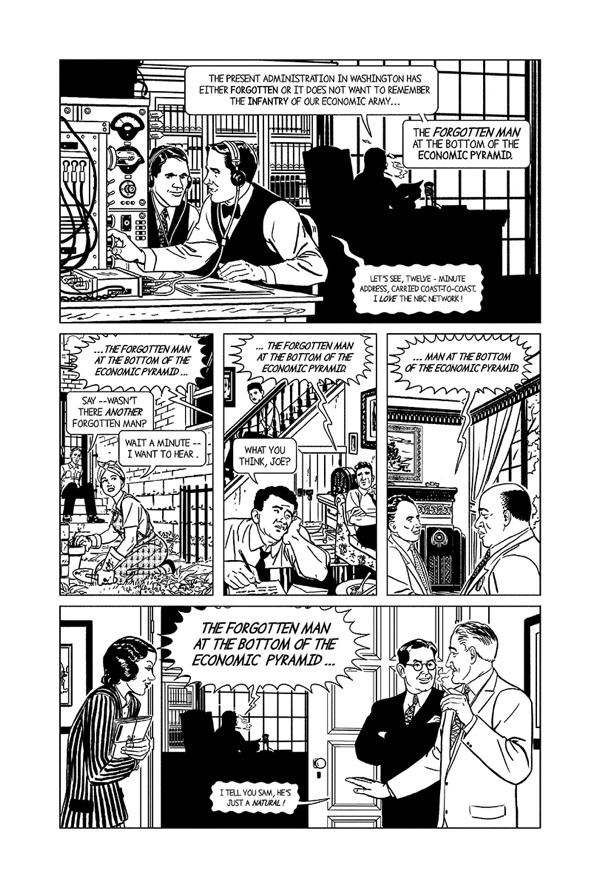
Given my own liberal views (and lack of knowledge of the subject), I’m probably not the best person to judge whether the book’s view that The New Deal extended the economic hardships of the Depression, and Roosevelt and pals were to blame for a variety of ills is the truth. Yes, it’s Hayek vs Keynes over and over again. That said, for someone who writes history books, Shlaes’ research into comics was kinda…weird. Like the very word “mangas.” I guess this was a crash course and not an in-depth exploration.
Counterintuitive as it may sound, these graphic novels not only feature nonfiction but also lend themselves enviably to difficult nonfiction topics. Take Persepolis, a mauve-and-grey depiction of a girl’s life in the Iranian Revolution. Artist Marjane Satrapi depicts the habits of the Shah’s SAVAK officers and their terrifying successors, Khomeini’s PERFUMED police, better than any print history of Iran and certainly better than, say, the film Argo. Maus, another graphic novel, takes on a yet touchier subject, the Holocaust, and somehow manages to convey what happened without exploiting or reducing the record. What’s more, these long cartoon books have much the same capacity as films to entice the reader to delve deeper. As Bill Bennett, one who gets the medium, noted recently: “After reading the comic of The Iliad, then I read the children’s edition of The Iliad, and then I read The Iliad.”
Shlaes does have the know-how to link to an article I wrote on comics and libraries for PW, and she also tips us off to an illustration version of Hayek’s The Road to Serfdom, which will set every eco-comix fan’s heart a flutter.
Things REALLY get fun in the comments, where you can see good the old “comics are dumb” attitude in full flower! Ah how I missed you. There’s this:
One thing I learned about the Left: they prefer it when the kids don’t know how to read too well. They prefer kids who can be led around the parking lot singing Civil Rights songs and hymns to The Lorax. That, to them, is more “educational” than anything a kid might learn in a (shudder) book.
and THIS:
I am lower middle class and I have lived in some of the poorest regions in America (including Alabama, West Virginia, and Kentucky). I have been homeless. I have lived in homeless shelters. And I worked my TAIL off to get my kids an education.
It’s not elitist to point out that reading Marvel comics is something you should do on your own time, not something that should be treated as educational.
We teach literature because the great books have depths that cannot be accessed unless one learns a particular skill set first. Learning this skill set is part of being educated. Today’s kids are not getting that education – and that limits them.
and on and on…
Whatever its politics, Rivoche’s work on this book is AMAZING. All this ax-grinding and arguing could make for a very very dull book, but he goes out of his way to make it visually compelling. There’s a tumblr devoted to the book and you can see some of the pages. I can’t judge this book as history, but as a comic it’s stunning!


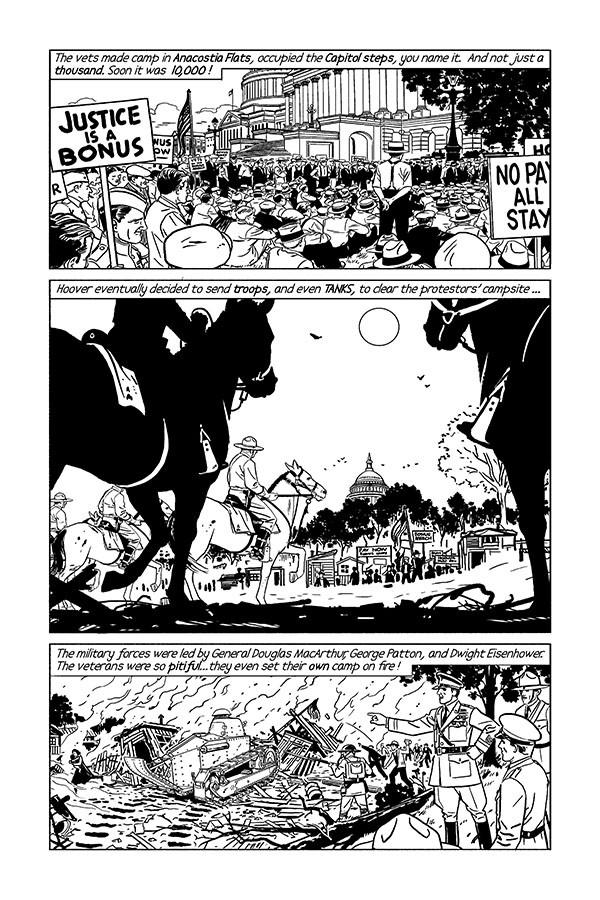
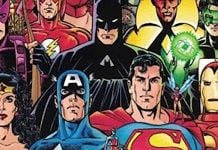
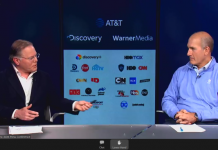
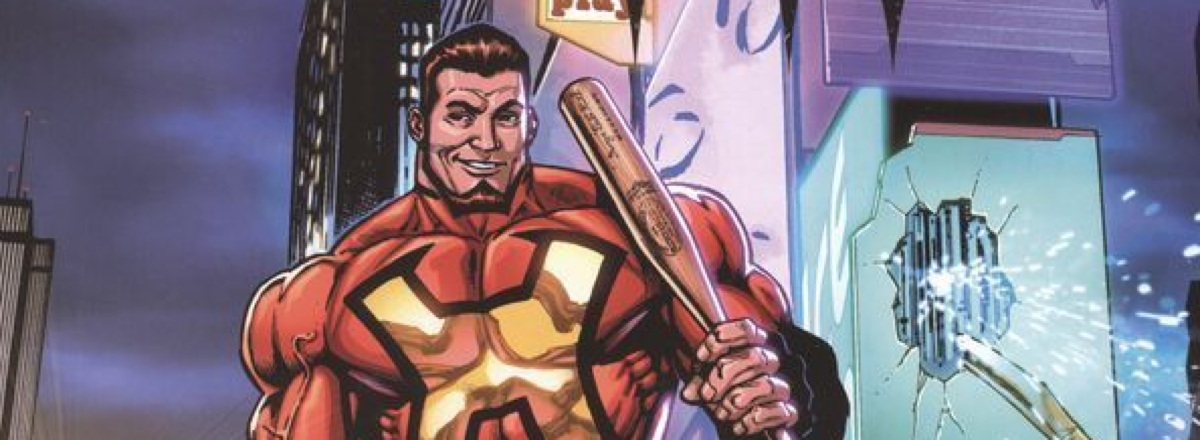



Oh, comment sections.
Those two comments you posted we’re enraging – and while I’m pretty far left on the political scale as well, I’m still… intrigued by this book. I might not agree with its contents but holy damn, Paul Rivoche!
“Our millennials only understand pictures. Recruitment posters and nudes, mostly.”
That was my favorite until I saw right above it…
“‘The artists had to work to live, clearly. But this kind of work, they let me know, and in the politest way, they would not take.’
Now, imagine if they had refused to illustrate a same-sex wedding.”
You stay classist, the National Review!
Amity Shlaes is a terrible historian. She wrote a book I read about Calvin Coolidge that was absolutely awful. Her book was essentially a cherry picking of favorable facts about Coolidge that kinda ignored most of what was going on while he was president.
So, yeah, she’s not even good in her own field, so why would we expect her to know anything about comics?
Yes, these people are all anti-government helping the poor and the middle class, but they have fits if anyone wants to cut the billions of dollars in government subsidies and tax credits going to corporations which are making record profits. They also think there’s nothing wrong with the government supporting the Keystone Pipeline whose whole purpose is for Canadian companies to refine their oil in Louisiana and export it to Asia, but not to America. Even when foreign companies (like BP) drill for oil in the US, America doesn’t get first dibs, it is sold to the highest bidder. Capitalism first, last and always at the expense of the American public.
Well, conservative religion has lots of comics, thanks to Jack Chick. Kingstone has a more “sunday school” approach to comics, and Zondervan has their ZGraphics line of Christian inspiration comics.
There’s also the occasional biography, such as Ayn Rand, and the Bluewater bios.
Then there’s Batman. Daddy Warbucks. Uncle Scrooge (who was friends with Teddy Roosevelt).
And let’s not forget the CIA comic distributed to the Contras during the Reagan Administration! (Actually, reprinted and translated from the Vietnam War edition.)
Someone’s apparently not aware that The Lorax is a book.
There’s no mention anywhere here of that fact that Chuck Dixon was the writer who adapted the book for the graphic novel.
Jackie, forgotten man indeed. I haven’t seen Dixon’s name mentioned once in all the promo on this book and was unaware he had anything to do with it. I’ll correct it where possible.
Yes, it’s Hayek vs Keynes over and over again.
>>
Most Americans who call themselves as “conservative” or “liberal” or “republican” or “democrat” define themselves in regard to issues that have very little (or nothing) to do with Hayek or Keynes. I suggest this for those who’d appreciate info on both:
http://www.amazon.com/Keynes-Hayek-Defined-Modern-Economics/dp/0393343634/ref=sr_1_1?ie=UTF8&qid=1401728225&sr=8-1&keywords=keyes+and+hyack
While Shales’ thesis is likely manure, I don’t begrudge her one entry in the graphic novel realm that includes Howard Zinn’s A People’s History of American Empire, Studs Terkel’s Working, Thom Hartmann’s We the People, Ilan Stavans and Lalo Alcaraz’s Latino USA, Pekar’s Students for Democratic Society, Wobblies: A Graphic History of the Industrial Workers of the World, Kings in Disguise and its sequel, The Bush Junta, Freedom Fries, The Adventures of Unemployed Man, Addicted to War, Occupy Comics, a two-volume manga adaptation of Marx’s Capital, Ted Rall, Peter Kuper, Tom Tomorrow, Ward Sutton, Ruben Bolling, Tim Krieder, Lloyd Dangle, pretty much the entire library of Joe Sacco, biographies of Trotsky, Castro, King, Malcolm X, Gandhi, Emma Goldman, Margaret Sanger, Nat Turner and three (!) biographies of Che Guevara. Damn does the left have their shit together in this medium! Conservatives are taking the remedial course.
“There veterans were o pitiful…” I wonder if they include MacArthur firing upon this pitiful veterans and murdering a few.
Ah, I went and actually read the article this post is linking to and see she made much the same point, mentioned some of the same books and lumped in Gonick and the Economix book because they’re accurate instead of revisionist. I should have looked.
You know what? I find that comics section to be about as good or better than any I’ve read on the internet. They seem moderately well-informed, speak in full sentences and don’t use ALL CAPS. There’s some ignorance about comics here and there, but that exists everywhere. How about this one:
“There are so many comics/graphic novels that should appeal to conservatives that are smart and have artistic/literary merit. Zahra’s Paradise by Amir and Khalil deals with Iran’s habit of “disappearing” people who step too far out of line. Boxers and Saints by Catholic graphic novelist Gene Luen Yang presents the Boxer Rebellion from two competing perspectives. Years of the Elephant by Willy Linhout follows a grieving father after his only son commits suicide. Epleptic by David B. certainly holds up as fraudulent the various fringe ideologies found in the West. The Walking Man by Jiro Taniguchi gently displays traditional Japanese aesthetic values. Pyongyang: A Journey in North Korea by Guy Delisle presents a travelogue of the bizzaro world that is North Korea.
Yeah, there is a lot of junk to wade through in comics, but that’s true of the publishing industry at large. Read Maus and you can never dismiss the medium again.”
“comments” section, not “comics” section. Force of habit.
The retreat into text culture as a sign of educational substance would appear to be one factor, perhaps exacerbated by the rise of underground comics and the presence of comics in punk culture, movies, do-goodery social justice posters and other pop phenomena.
Before the 1970s though, my sense was that conservatives dominated message comics, with the Catholic Church leading the way. And of course, Jimmy Swaggart. Then there’s stuff like the comic bios of Barry Goldwater, Pope JP II, and, of course, the plethora of contemporary conservative religious comics that Torsten mentioned.
An interesting piece of evidence re this is Jack Chick’s autobiographical account of how he discovered that comics could serve as educational tools – if it worked for Chinese communists as a means to propagandize children, it could work for Christians too. In its cultural context, it’s a rather daring insight and action plan – not too many conservative leaders, especially in education, were looking to Mao for inspiration.
As the web increasingly mainstreams the value of image literacy, my guess is that we’re not too far away from history-themed graphic novel series branded by Glenn Beck, Bill O’Reilly or Rush Limbaugh. They’d sell, big. The first presidential candidate to release a biographical/policy graphic novel is going to get gobs of great free press.
“The first presidential candidate to release a biographical/policy graphic novel is going to get gobs of great free press.”
http://www.amazon.com/Health-Care-Reform-Necessary-Works/dp/0809053977/ref=sr_1_1?ie=UTF8&qid=1401756383&sr=8-1&keywords=health+care+reform
Rush Limbaugh WARNED us that Chuck Dixon was a big Hollywood liberal back in 2012 with his sinister plot to create Bane to bring down Mitt Romney. Why didn’t we listen?
^_^
Allen, I agree with your comment “does the left have their shit together in this medium! Conservatives are taking the remedial course.” You’re so right. But we’ll learn. Marvel and DC are so unrelentingly liberal and anti-conservative, I’d settle for politically neutral comics with good adventure stories! But when it comes to nonfiction and biographical comics, I would like to see more conservative themes represented. I think it will come. Meanwhile, Shlaes’ thoughts echo my own and I love Chuck Dixon. I look forward to reading this.
While it mystifies me how heavy-handed and tone-deaf well-meaning conservatives can be, I wouldn’t say the left has a disproportionate quantity of its shit together in this medium because they are disproportionately smarter, or more qualified. In popular culture, including comics, the left has an enormous presence compared conservatives, so it stands to reason that they have a quality advantage.
It’s like arguing in 1960 that men really had their shit together compared to women because there were so many successful men.
I’ve been a fierce independent for more than 30 years, yet, if I had a buck for every time one of my comics peers has labeled me a “conservative,” I’d be typing this from my beach house on St. Kitts. Why does this happen? Well, because comics folks are overwhelmingly lefty.
As an independent, I go out of my way to hear both sides of an argument. The reason media outlets like Fox news are so popular compared to their overtly lefty competition like MSNBC is not because conservatives outnumber liberals (they don’t), it’s because in addition to their strong core of conservative watchers, they have lots of independents tuning in. And why do independents tune in to Fox News and not, say, NBC News? Simple. To get the conservative viewpoint that is often suppressed by a media outlets like NBC — outlets that any savvy person knows are overwhelmingly populated by liberals.
And before some lefty jumps in and says media outlets like “The New York Times” are not lefty, go read President Obama’s book, “The Audacity of Hope.” Obama talks in a matter-of-fact fashion about the obvious political leanings of various media outlets. Now I’m waiting for the uber-lefty to jump in and say, “But Obama’s not a liberal!”
In comics, as with my news, I pine for more political diversity. But decades of being a comics aficionado makes it crystal clear to me that it’s a hostile environment for the right out there, particularly if they want to get a paying gig. Typically, the comics left majority labels left-leaning comics “normal,” while anything leaning right is “jingoistic propaganda.” That ain’t accurate, nor is it fair.
Man, does that art look great. No interest in reading some right-wing slanted historical hit job though. I’ll be looking forward to finding more of Paul Rivoche’s work.
“But where are the conservative mangas and graphic novels?”
>>
I have friends who now refer to themselves as “Libertarian Left” — they’re against prayer in school, against all bigotry, want the gov shrunk but want it to still strongly regulate in areas of public safety and protecting public interest in a strong currency — Heeyyy: how ’bout some graphic novels from them(?)
R. Maheras, you’re a breath of fresh air.
“There’s no mention anywhere here of that fact that Chuck Dixon was the writer who adapted the book for the graphic novel.”
Well, at least it will be well written and make some kind of sense.
Mike
http://online.wsj.com/articles/dixon-and-rivoche-how-liberalism-became-kryptonite-for-superman-1402265792
(Pay wall, but IE8 let me read it.)
Chuck Dixon and Paul Rivoche respond to this article!
(Although they fail to mention Superman’s early Golden Age persona, where he took on corrupt politicians. Like Jesus Christ, what would be the Right’s reaction if he appeared and crusaded for equality, justice, and fair play?)
Comments are closed.